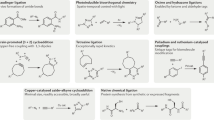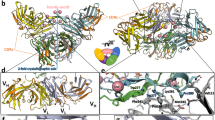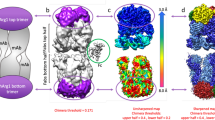Abstract
SEVERAL examples have been reported recently1 of antibody catalysis2of reactions that are strongly disfavoured because of the high free energy of the transition state. Here we show that catalytic antibodies can be used to promote a particularly useful kind of reaction from a synthetic point of view: one involving an intermediate that is highly unstable in water. We show that an antibody elicited against the quaternary ammonium ion 4a (Fig. 1) catalyses the protonation of the enol ether 1 to form, with complete enantio-selectivity, an oxocarbonium intermediate. This species is highly reactive in water, and would normally react with a water molecule to give the corresponding ketone 2. But the antibody provides a hydrophobic environment that allows the oxocarbonium ion instead to undergo an intramolecular reaction to form an enantiomerically pure ketal 3. This result shows that catalytic antibodies can exclude solvent molecules entirely from crucial steps on the reaction pathway.
This is a preview of subscription content, access via your institution
Access options
Subscribe to this journal
Receive 51 print issues and online access
$199.00 per year
only $3.90 per issue
Buy this article
- Purchase on Springer Link
- Instant access to full article PDF
Prices may be subject to local taxes which are calculated during checkout
Similar content being viewed by others
References
Lerner, R. A., Benkovic, S. J. & Schultz, P. G. Science 252, 659–667 (1991).
Schultz, P. G. & Lerner, R. A. Acc. Chem. Res. 26, 391–395 (1993).
Banait, N. S. & Jencks, W. P. J. Am. chem. Soc. 113, 7951–7958 (1991).
Pothier, N., Goldstein, S. & Deslongchamps, P. Helv. chim. Acta 75, 604–620 (1992).
Jenks, W. P. Catalysis in Chemistry and Enzymology 52–60 (Dover, New York, 1987).
Schmir, G. L. & Gunningham, B. A. J. Am. chem. Soc. 87, 5692–5700 (1965).
Reymond, J.-L., Janda, K. D. & Lerner, R. A. Angew. Chem. int. Ed. engl. 30, 1711–1713 (1991).
Sinha, S. C., Keinan, E. & Reymond, J.-L. Proc. natn. Acad. Sci. U.S.A. 90, 11910–11913 (1993).
Reymond, J.-L., Jahangiri, G. K., Stoudt, C. & Lerner, R. A. J. Am. chem. Soc. 115, 3909–3917 (1993).
Reymond, J.-L., Reber, J.-L. & Lerner, R. A. Angew. Chem. int. Ed. engl. 33, 475–477 (1994).
Jahangiri, G. K. & Reymond, J.-L. J. Am. chem. Soc. 116, 11264–11274 (1994).
Lewis, C., Paneth, P., O'leary, M. H. & Hilvert, D. J. Am. chem. Soc. 115, 1410–1413 (1993).
Sinha, S. C., Keinan, E. & Reymond, J.-L. J. Am. chem. Soc. 115, 4893–4894 (1993).
Schuster, M., Wang, P., Paulson, J. C. & Wong, C.-H. J. Am. chem. Soc. 116, 1135–1136 (1994).
Evans, D. A., Ennis, M. D. & Mathre, D. J. J. Am. chem. Soc. 104, 1737–1739 (1982).
Author information
Authors and Affiliations
Rights and permissions
About this article
Cite this article
Shabat, D., Itzhaky, H., Reymond, JL. et al. Antibody catalysis of a reaction otherwise strongly disfavoured in water. Nature 374, 143–146 (1995). https://doi.org/10.1038/374143a0
Received:
Accepted:
Issue Date:
DOI: https://doi.org/10.1038/374143a0
This article is cited by
-
Protein Microarrays-Based Strategies for Life Detection in Astrobiology
Space Science Reviews (2008)
-
Using antibodies to perturb the coordination sphere of a transition metal complex
Nature (1996)
Comments
By submitting a comment you agree to abide by our Terms and Community Guidelines. If you find something abusive or that does not comply with our terms or guidelines please flag it as inappropriate.



